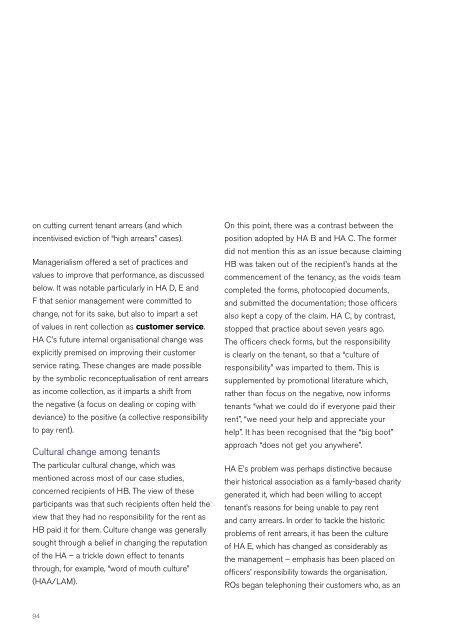Rent arrears management practices in the housing association sector
Rent arrears management practices in the housing association sector
Rent arrears management practices in the housing association sector
Create successful ePaper yourself
Turn your PDF publications into a flip-book with our unique Google optimized e-Paper software.
on cutt<strong>in</strong>g current tenant <strong>arrears</strong> (and which<br />
<strong>in</strong>centivised eviction of “high <strong>arrears</strong>” cases) .<br />
Managerialism offered a set of <strong>practices</strong> and<br />
values to improve that performance, as discussed<br />
below . It was notable particularly <strong>in</strong> HA D, E and<br />
F that senior <strong>management</strong> were committed to<br />
change, not for its sake, but also to impart a set<br />
of values <strong>in</strong> rent collection as customer service .<br />
HA C’s future <strong>in</strong>ternal organisational change was<br />
explicitly premised on improv<strong>in</strong>g <strong>the</strong>ir customer<br />
service rat<strong>in</strong>g . These changes are made possible<br />
by <strong>the</strong> symbolic reconceptualisation of rent <strong>arrears</strong><br />
as <strong>in</strong>come collection, as it imparts a shift from<br />
<strong>the</strong> negative (a focus on deal<strong>in</strong>g or cop<strong>in</strong>g with<br />
deviance) to <strong>the</strong> positive (a collective responsibility<br />
to pay rent) .<br />
Cultural change among tenants<br />
The particular cultural change, which was<br />
mentioned across most of our case studies,<br />
concerned recipients of HB . The view of <strong>the</strong>se<br />
participants was that such recipients often held <strong>the</strong><br />
view that <strong>the</strong>y had no responsibility for <strong>the</strong> rent as<br />
HB paid it for <strong>the</strong>m . Culture change was generally<br />
sought through a belief <strong>in</strong> chang<strong>in</strong>g <strong>the</strong> reputation<br />
of <strong>the</strong> HA – a trickle down effect to tenants<br />
through, for example, “word of mouth culture”<br />
(HAA/LAM) .<br />
94<br />
On this po<strong>in</strong>t, <strong>the</strong>re was a contrast between <strong>the</strong><br />
position adopted by HA B and HA C . The former<br />
did not mention this as an issue because claim<strong>in</strong>g<br />
HB was taken out of <strong>the</strong> recipient’s hands at <strong>the</strong><br />
commencement of <strong>the</strong> tenancy, as <strong>the</strong> voids team<br />
completed <strong>the</strong> forms, photocopied documents,<br />
and submitted <strong>the</strong> documentation; those officers<br />
also kept a copy of <strong>the</strong> claim . HA C, by contrast,<br />
stopped that practice about seven years ago .<br />
The officers check forms, but <strong>the</strong> responsibility<br />
is clearly on <strong>the</strong> tenant, so that a “culture of<br />
responsibility” was imparted to <strong>the</strong>m . This is<br />
supplemented by promotional literature which,<br />
ra<strong>the</strong>r than focus on <strong>the</strong> negative, now <strong>in</strong>forms<br />
tenants “what we could do if everyone paid <strong>the</strong>ir<br />
rent”, “we need your help and appreciate your<br />
help” . It has been recognised that <strong>the</strong> “big boot”<br />
approach “does not get you anywhere” .<br />
HA E’s problem was perhaps dist<strong>in</strong>ctive because<br />
<strong>the</strong>ir historical <strong>association</strong> as a family-based charity<br />
generated it, which had been will<strong>in</strong>g to accept<br />
tenant’s reasons for be<strong>in</strong>g unable to pay rent<br />
and carry <strong>arrears</strong> . In order to tackle <strong>the</strong> historic<br />
problems of rent <strong>arrears</strong>, it has been <strong>the</strong> culture<br />
of HA E, which has changed as considerably as<br />
<strong>the</strong> <strong>management</strong> – emphasis has been placed on<br />
officers’ responsibility towards <strong>the</strong> organisation .<br />
ROs began telephon<strong>in</strong>g <strong>the</strong>ir customers who, as an




